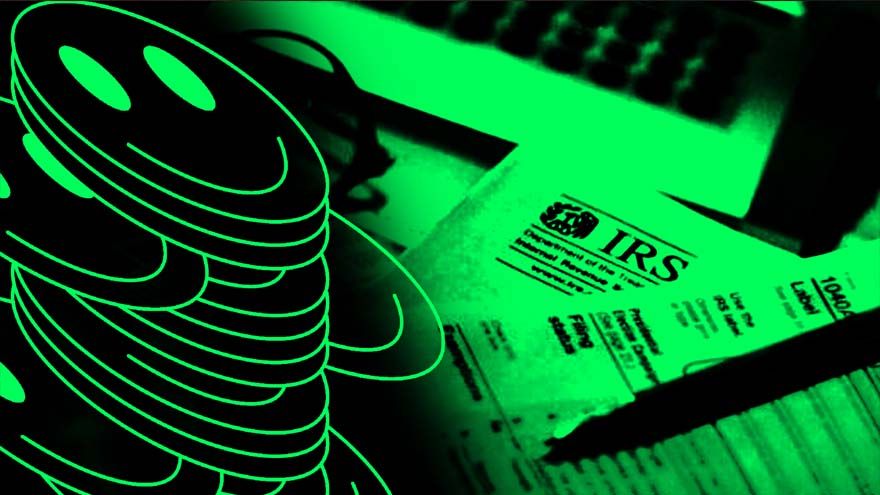
The IRS is mandating that blockchain staking rewards should be reported as income.
Web3 advocates are pushing back against a recent ruling from the U.S. Internal Revenue Service declaring that staking rewards are immediately taxable.
On July 31, the IRS published its Revenue Ruling 2023-14, mandating that stakers report rewards accrued as income when they gain control over said assets.
Stakers must report the “fair market value” of rewards as gross income during the year they are received. The IRS cited that any form of income, including property or services, is considered gross income according to Section 61 of the Internal Revenue Code.
“If a cash-method taxpayer stakes cryptocurrency native to a proof-of-stake blockchain and receives additional units of cryptocurrency as rewards when validation occurs, the fair market value of the validation rewards received is included in the taxpayer’s gross income in the taxable year in which the taxpayer gains dominion and control over the validation rewards.” the ruling said.
The ruling formalizes the position taken by the IRS in its 2021 case against Jessica and Joshua Jarrett. The couple argued that staking rewards should be taxed based on the price at which the assets are sold. The IRS honored the Jarretts’ requested refund but dismissed the case
Regulators Target Staking
The news comes as staking is increasingly falling into the crosshairs of regulators.In February, the U.S. Securities and Exchange Commission sued the centralized exchange Kraken for failing to register its custodial staking service. Kraken paid a $30M fine. In June, the SEC sued top U.S. exchange, Coinbase, alleging that it was offering unregistered securities, including via its staking service. Coinbase is fighting the lawsuit.
The SEC also levied similar accusations towards Binance’s staking service in a lawsuit against the exchange.
The ruling clarified that users staking via third-party services such as centralized exchanges are also subject to the ruling. The IRS also reiterated that taxpayers must report cryptocurrency income derived from mining or providing services.
Web3 Advocates Push Back
The IRS’s ruling is attracting criticism from the crypto community. Jason Schwartz, co-partner at law firm, Fried Frank, tweeted that the ruling was disappointing despite being unsurprising.
“When taxpayers extract minerals, harvest crops, breed livestock, produce art or goods, or otherwise exercise dominion and control over property for which no previous owner exists, they aren’t taxed until they sell the property,” Schwartz said. “If newly minted tokens are more like newly extracted minerals than service payments or found treasure trove, they shouldn’t be taxed until sold.”
The IRS’s view “ignores the economic and practical reality” of cryptocurrency, said Joshua Jarrett of the Proof of Stake Alliance, a PoS advocacy group.
“Including newly created tokens in income demonstrably overstates stakers’ gains,” the statement read. “If every token holder receives 10 percent new tokens, then no one has economic gain from staking.”
- SEO Powered Content & PR Distribution. Get Amplified Today.
- PlatoData.Network Vertical Generative Ai. Empower Yourself. Access Here.
- PlatoAiStream. Web3 Intelligence. Knowledge Amplified. Access Here.
- PlatoESG. Automotive / EVs, Carbon, CleanTech, Energy, Environment, Solar, Waste Management. Access Here.
- BlockOffsets. Modernizing Environmental Offset Ownership. Access Here.
- Source: https://thedefiant.io/irs-rules-staking-rewards-are-immediately-taxable-web3-advocates-push-back
- :has
- :is
- 10
- 2021
- 31
- 98
- a
- According
- Accusations
- Additional
- advocacy
- advocates
- against
- Alliance
- also
- and
- any
- ARE
- argued
- Art
- AS
- Assets
- At
- attracting
- back
- based
- BE
- being
- blockchain
- BREED
- but
- by
- centralized
- centralized exchange
- Centralized Exchanges
- cited
- clarified
- code
- coinbase
- comes
- commission
- community
- considered
- control
- Couple
- created
- criticism
- crops
- crosshairs
- crypto
- crypto community
- cryptocurrency
- custodial
- Derived
- Despite
- disappointing
- during
- Economic
- Every
- exchange
- Exchanges
- Exercise
- exists
- extract
- failing
- fair
- Falling
- February
- fighting
- fine
- Firm
- For
- form
- found
- from
- Gain
- Gains
- goods
- gross
- Group
- harvest
- holder
- honored
- HTTPS
- immediately
- in
- included
- Including
- Income
- increasingly
- internal
- Internal Revenue Service
- into
- IRS
- IT
- ITS
- jpg
- July
- june
- Kraken
- Law
- law firm
- lawsuit
- like
- Market
- market value
- minerals
- Mining
- minted
- more
- must
- native
- New
- newly
- news
- no
- of
- offering
- on
- ONE
- or
- otherwise
- over
- owner
- paid
- payments
- percent
- plato
- Plato Data Intelligence
- PlatoData
- PoS
- position
- Practical
- previous
- price
- produce
- proof
- Proof-of-Stake
- property
- providing
- Push
- push back
- Pushing
- Read
- received
- receives
- recent
- refund
- register
- Regulators
- report
- Reported
- revenue
- Rewards
- rules
- ruling
- s
- Said
- SEC
- Section
- Securities
- Securities and Exchange Commission
- sell
- service
- Services
- should
- similar
- sold
- stake
- stakers
- Staking
- Staking Rewards
- subject
- such
- sued
- taken
- Target
- Taxpayer
- taxpayers
- than
- that
- The
- then
- they
- third-party
- to
- token
- Tokens
- top
- towards
- u.s.
- U.S. Internal Revenue Service
- U.S. Securities
- U.S. Securities and Exchange Commission
- units
- unregistered
- unregistered securities
- until
- users
- validation
- value
- via
- View
- was
- Web3
- when
- which
- year
- zephyrnet









